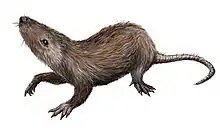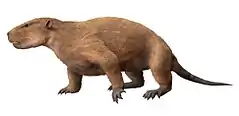Acheronodon
Acheronodon is a genus of herbivorous arboreal mammal which belongs to the family Microcosmodontidae and which was endemic to North America during the Early Paleocene subepoch (66—56.8 mya) and in existence for approximately 9.2 million years.[1]
| Acheronodon Temporal range: | |
|---|---|
| Scientific classification | |
| Domain: | Eukaryota |
| Kingdom: | Animalia |
| Phylum: | Chordata |
| Class: | Mammalia |
| Order: | †Multituberculata |
| Family: | †Microcosmodontidae |
| Genus: | †Acheronodon Archibald J.D., 1982 |
| Species: | †A. garbani |
| Binomial name | |
| †Acheronodon garbani Archibald J.D., 1982 | |
It is a member of the extinct order Multituberculata and lies within the suborder Cimolodonta.
The species Acheronodon garbani is known from fossils found in the Puercan (Paleocene)-age formations of Tullock Formation in Montana (United States) and possible specimens from the Porcupine Hills in Alberta, Canada. The holotype was found in Montana.
References
- Archibald (1982), "A study of Mammalia and geology across the Cretaceous-Tertiary boundary in Garfield County, Montana." Univ. Calif. Publ. Geol. Sci. 122, p. 1-286.
- Kielan-Jaworowska Z & Hurum JH (2001), "Phylogeny and Systematics of multituberculate mammals." Paleontology 44, p. 389-429.
- Much of this information has been derived from Eucosmodontidae, Microcosmodontidae and Taeniolabidoidea, an Internet directory.
This article is issued from Wikipedia. The text is licensed under Creative Commons - Attribution - Sharealike. Additional terms may apply for the media files.

